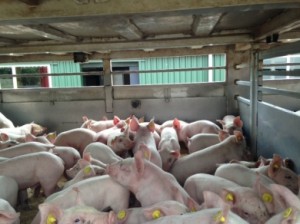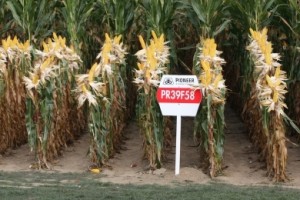Worldlog Semana 6 – 2014
Por fin volverá a llegar el control del transporte de ganado a manos de las autoridades públicas. Ya en 2011 presenté una moción sobre este asunto, apoyada por mayoría. El caso fue que había que esperar hasta 2014, para que la secretaria del estado Dijkstra opinara lo mismo.
La semana pasada, Sharon Dijksma, de Asuntos Económicos, nos hizo saber que ya no reconoce el sistema de control y supervisión al sector de transporte animal y que ella misma retomara esta responsabilidad.
Cada año millones de animales pasan por la frontera en camión. Este trasporte frecuentemente conlleva un sufrimiento grave. Muchas veces, los animales llevan más que ocho horas de pie sin agua ni comida en camiones abarrotados. Apenas se respetan las normativas protectoras y se ha recortado drásticamente en el ámbito del control público durante los años pasados. La autorregulación dentro del sector del trasporte ganadero resulta sin resultado. El gobierno ha sido claro: la administración pública tiene que hacer lo que hace mejor; es decir la normalización, el control y el mantenimiento. El control de velocidad tampoco dedaríamos en manos de los mismos conductores. ¡Nos gusta que el control del trasporte ganadero vuelve bajo la responsabilidad del estado y seguiremos esforzándonos para cesar el maltrato!
La semana pasada, mi colega de trabajo Esther Ouwehand una y otra vez se ha opuesto a la introducción de un nuevo cultivo genético en la UE. La Comisión Europea amenaza con la aprobación del cultivo de la especie de maíz 1507, una especie genéticamente manipulada por Pioneer. Si autorizan el cultivo, todos los estados miembros serán obligados a permitir en sus tierras el cultivo de esta controvertida planta.
Los países que prefieren no correr ningún riesgo con el tema de la ingeniería genética ya se objetan desde hace tiempo, como Austria y Francia. Los Países Bajos todavía no han tomado su posición. La posición de Holanda podría ser la posición decisiva en este proceso de resolución, que se trata de la autorización del cultivo maíz 1507 para toda la EU. Por lo tanto hemos convocado a nuestro gobierno para que priorice la libertad de elección de los ciudadanos, agricultores y miembros estados y para que se oponga a la admisión de nuevos cultivos genéticamente manipulados.
Rechazamos rotundamente la manipulación genética y opinamos que, de todas maneras, es ilícito obligar a los estados miembros a cultivar cultivos genéticos en sus tierras. El maíz tanto discutido del fabricante Pioneer es una planta manipulada que desprende una substancia venenosa constantemente. El veneno, producido por la misma planta, está para matar el insecto-mariposa Ostrinia nubilalis que se come las flores y el tallo del maíz. Aquel veneno perjudica al mismo tiempo a otras mariposas y polillas. Además, la planta maíz 1507 se ha hecho resistente contra pesticidas que contengan glufosinato, un pesticida tóxico. Los agricultores advierten del peligro de que, al hacerse resistentes los cultivos agrícolas, el uso de pesticidas aumentará. Mientras tanto, Bruselas está a punto de admitir un cultivo resistente a una pesticida con significativos riesgos para la salud de mamíferos y otros organismos. Por las mismas razones de peligro del glufosinato se está intentando a restringir el uso de este pesticida. ¡Ojalá nuestro gobierno vea el peligro de la admisión del maíz genéticamente manipulado y la detenga!
Es deprimente leer sobre la situación en Bulgaria y Romanía. Lee el blog sobre esta situación en The Economist.
Para esta semana, otra foto de @Fascinatingpics: Freefall!
¡Hasta la semana que viene!
Marianne
The control of animal transportation will at last go back into the hands of the government. In 2011, I already laid down a motion on this, which was then also supported by the majority, yet we had to wait until 2014 before the State Secretary finally realised that animal transportation couldn’t go on like this. State Secretary Dijksma of Economic Affairs finally informed us last week that she no longer acknowledges the supervision and control system of the animal transportation industry and that she is taking responsibility into her own hands again.
Each year, millions of animals are transported across the borders. Those transportations regularly involve animal suffering. Animals often have to stand in overcrowded lorries for more than eight hours without any food or water. Animal protection regulations are seriously violated and drastic cuts were imposed on government control over the past years. Self-regulation within the animal transportation industry is obviously not working. The Lower House was clear: The government must do what it is there to do, namely to set standards, and to control and maintain them. You would not opt for car drivers to perform their own speed checks either. We are glad that the supervision is given back to the government and we will continue to do our best to stop them mucking about with animals.
Last week, my colleague Esther Ouwehand made out a case against the introduction of a new GM crop in the EU. It is feared that the European Commission will permit the growing of the genetically modified maize line 1507 of Pioneer. If that happens, all European Member States will have to allow the growing of the controversial crop on their lands.
Countries that do not want to run risks with genetically engineered foods like Austria and France have been objecting for a long time. The Netherlands has still not made clear its position on this, while this can be the determining factor in reaching a decision on permitting this crop in the entire EU. We have therefore urged our government to put the choice of civilians, agriculturists and Member States first and foremost, and to vote against permitting such new GM crops.
We resolutely reject genetic modification and feel that no country should be forced to have GM crops grow on their lands. The controversial maize of Pioneer is a genetically modified plant, which releases a poisonous substance. The poison produced by the plant itself is intended to eliminate the corn borer, but is harmful to butterflies and moths at the same time. Additionally, the plant has been made resistant to pesticides containing gluphosinate. While scientists warn that the use of pesticides will increase when crops are made resistant, Brussels is on the verge of accepting a GM crop that is resistant against a pesticide that has great risks for mammals and other organisms. Because of the dangers of gluphosinate, it is tried to restrain the use of this pesticide. Hopefully our government will also see the dangers of allowing genetically modified maize and stop it!
It is depressing to read how Bulgaria and Romania are doing. Read here the blog in the Economist about the situation in those two countries.
And this week again a picture of @Fascinatingpics: Freefall!
Until next week!
Marianne

